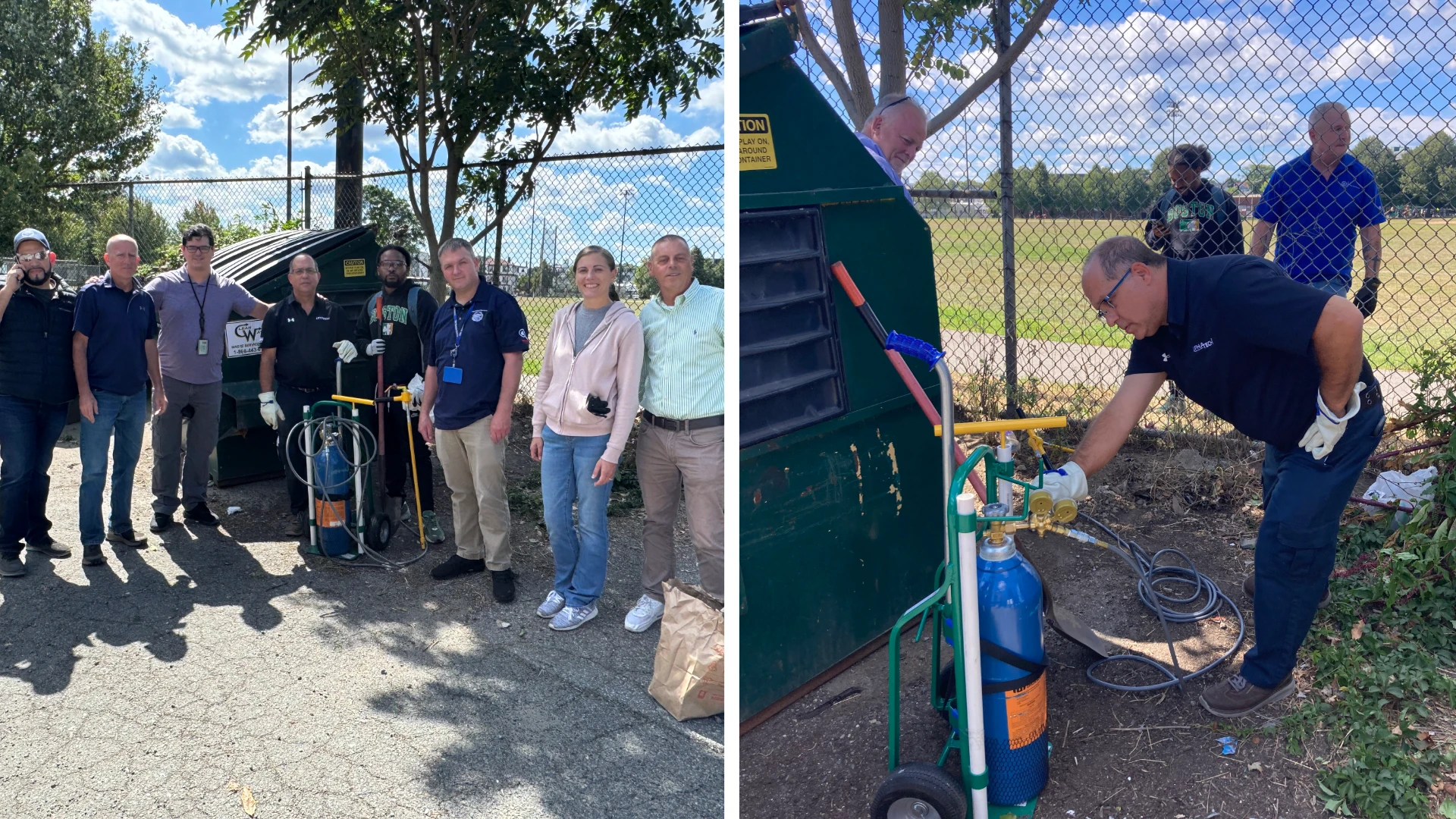|
April 2010 October 2010 May 2011 October 2011 January 2012 April 2012 May 2012 |
The ongoing dispute over the future of fipronil between BASF and Makhteshim, along with its U.S. subsidiary Control Solutions, Inc. (CSI) – which lay dormant for much of the winter, at least publicly – has entered a new, potentially critical phase as the parties once again squared off in U.S District Court in early May.
In the latest round of the high-stakes legal battle, which began more than two years ago, BASF asked Judge William L. Osteen, Jr. of the U.S. District Court for the Middle District of North Carolina to find Makhteshim Agan of North America (MANA) in contempt for allegedly violating a court order restricting the company from producing fipronil-based termiticides using any manufacturing process other than that set forth in the original order, a charge Makhteshim denies.
At the center of the dispute is whether or not Makhteshim infringed on a BASF manufacturing “process” patent for fipronil, and thus is in violation of an October 2010 consent agreement signed by the two parties (see timeline, right sidebar). In addition to restricting MANA from entering the U.S. market with fipronil-based termiticides using a manufacturing process other than that which they represented at that time would not infringe BASF’s manufacturing patents (’943 and ’945), the consent agreement states MANA must promptly notify BASF of any “material change” in the company’s manufacturing process for fipronil, marketed in the United States as Taurus SC.
According to BASF’s motion for contempt, which was filed on April 30, MANA and CSI “violated that Consent Judgment by selling in the United States fipronil made with a materially different process and providing BASF with no notice at all. BASF believes the new process is likely to infringe one of its patents and seeks further information to confirm that conclusion.”
Jan Buberl, director of specialty products, BASF North American Crop Protection, said that in the company’s ongoing testing of Taurus SC, BASF discovered a certain chemical reactant, trifluoraetic acid (TFA), “that was not permitted or disclosed as part of the manufacturing process identified by Makhteshim in connection with the agreed upon order,” according to a company press release.
CSI President Mark Boyd disputes that claim, noting MANA has “never varied in the way that it makes fipronil technical,” a point echoed by Moshe Nussbaum, global head of insecticide sector, Makhteshim Agan Industries (MAI). “Our position remains the same – that there has been no change at all, nor any material change, in the manufacturing process of fipronil,” he said. “MAI manufactures fipronil using a proprietary process and has filed a patent application to protect its intellectual property rights to this process.”
It’s important to note that the motion filed by BASF is not a patent infringement claim, but rather a motion for discovery. “It will be a question for the court to determine whether MANA is using TFA,” Buberl said. “As indicated in our pleadings, BASF has replicated its findings of TFA in multiple samples of Taurus. The original formulation as disclosed by MANA is subject to a protective order. The conclusion would be if you find the reactant in the final product there is a high likelihood that it was used in the manufacturing process. That is why we are asking the court for new discovery on this issue.”
In addition to seeking further information about the reactant issue, as part of its motion for contempt BASF is asking the court to provide various forms of relief for the “harm incurred due to Defendants’ non-compliance with the Court’s Order.” Specifically, they are asking the court to:
- Prevent MANA/CSI from making, selling or offering for sale in the United States any products containing fipronil manufactured by any process other than the “currently intended process” as defined in the original consent judgment;
- Order MANA/CSI to provide BASF with an accounting of all sales in the United States of Taurus SC, or any other fipronil-containing products manufactured by the Defendants, occurring after the date of the court’s order, identifying for each sale the product sold; the date of the sale; the quantity sold; the batch identification of the product sold; and whether the batch was made by other than the currently intended process;
- Order MANA/CSI to provide BASF with discovery on the process(es) by which all fipronil in Defendants’ U.S. fipronil-containing products has been made;
- Order MANA/CSI to pay BASF damages for all sales of Taurus SC product, or any other fipronil-containing product, manufactured in violation of the court’s order;
- Order MANA/CSI to verify that all existing inventory produced in violation of the court’s order and intended for sale in the United States has been destroyed; and
- Order MANA/CSI to pay BASF all costs, expenses and fees, including but not limited to reasonable attorneys’ fees, incurred by BASF in connection with the case.
Buberl said predicting what the court ultimately will decide is “speculation,” but there are a wide range of options available including “remedies or sanctions” if the court finds in BASF’s favor.
While recognizing the high-stakes nature of the litigation, Makhteshim’s Nussbaum remains confident in the company’s position. “We quite simply don’t see that BASF’s motion has merit,” he said. “We are also confident in our belief that the court will deny the motion and recognize their ongoing efforts as an attempt to disrupt the marketplace and our customer relationships.”
Accordingly, three days after BASF’s motion was filed with the court, MANA and CSI provided a “preliminary response” opposing the motion and highlighting recent correspondence between the parties that it claims illustrates a desire on BASF’s part to “interfere” with the company’s channel relationships and customers. (Visit bit.ly/fipronil-legal-battle, for a transcript of that correspondence.)
“Based on the timing of the recent court filing, BASF delayed this legal action until April 2012, which is the peak time for termite control,” observed Nussbaum. “Our assumption is that BASF strategically planned another attempt to negatively impact MAI/CSI channel sales alongside causing interference with customers and channel relationships regarding the case. At this time, MAI and CSI are confident in their ability to ‘call out’ BASF allegations as untrue, claim BASF findings are once again without technical merit, and believe the U.S. court system will deny the motion – recognizing their intent to interrupt both organization’s business and relationships successes in the marketplace.”
BASF’s Buberl, however, disagrees with Makhteshim’s characterization of its motivation for filing the motion. “BASF is only trying to enforce its rights under the Consent Judgment,” he said. “Prior to its May 1, 2012 filing, BASF did seek to discuss this issue with MANA but ultimately had no choice but to seek the court’s intervention.”
With the termite season in full swing and favorable weather conditions through-out the United States contributing to robust business, the financial stakes are high, raising concerns for Control Solutions, Inc. “We view BASF’s recent filing to have the potential to cause hardship to CSI’s existing and potential CSI customer base, especially if product is unavailable during a critical use season,” Boyd said. “We also might anticipate severe economic losses to CSI as a result of BASF’s various attempts to confuse and disrupt the marketplace. I think it is very distracting for the industry to have this kind of issue at the height of the termite season and when the market wants to know that high quality key solutions will be available to meet marketplace demand.”
Raising the stakes even higher is the market uncertainty caused by ongoing litigation between BASF and Makhteshim, both major players in the global pesticide market, including the U.S. structural pest control industry where Termidor, BASF’s popular termiticide boasts 65 percent of the liquid termiticide market. “What is very clear is that the risk and exposure of using Taurus has increased,” Buberl said, “and with this finding the question is around the IP of the entire fipronil AI (active ingredient) not just the use patents.”
Despite the market uncertainty, both BASF and Makhteshim, along with Control Solutions, Inc., are moving ahead with their plans for the pest control industry, looking to take advantage of this year’s strong termite season. “MAI (Makhteshim Agan Group) and CSI will defend their legal rights to compete in the marketplace with Taurus SC,” said Shaul Friedland, head of MAI’s Americas region.
“MAI and CSI have opposed BASF’s motion and will continue to seek all available remedies to resolve the ongoing nature of this case,” added Boyd. “In the immediate, MAI and CSI will continue its sales and marketing initiatives which started after the court ruled in our favor early last year.”
For its part, Buberl said BASF will continue to “vigorously defend” its intellectual property and “invest in innovation” as illustrated by the recent introduction of Termidor HE Copack, the latest extension to the Termidor product line. “We remain vigilant in protecting our intellectual property,” said Buberl. “Providing innovative products to support customers’ success is our reason for being.”
As the parties continue to serve their respective customers, while preparing for another court battle, Judge Osteen – the same judge who presided over previous patent disputes between the three companies – held a telephone conference on May 3 to review the steps leading up to a final hearing on the contempt motion, questioning the various parties on the need for discovery. Following that discussion, according to the court docket, he ordered MANA to file a full response brief.
Eight days later MANA filed declarations by Makhteshim Chemical Works Chief Chemist Michael Grabarnick and CSI Chief Operating Officer Howard Stoddard, as well as a brief in support of a motion to seal a number of documents containing “confidential information” of a proprietary nature.
In the former declaration, Grabarnick denied approving any material changes to MANA’s formulation of fipronil. “As Chief Chemist any changes to the process of making fipronil must be approved by me before they may be implemented in our facilities,” he stated. “More specifically, the process of making fipronil carried out by Makhteshim does not use trifluoroacetic acid (‘TFA’) for any purpose. There has been no Material Change in the process of making fipronil as carried out by MCW.”
Six days later, on May 17, Judge Osteen held a Status Conference to determine whether depositions are needed or limited discovery is necessary to resolve the issues before the court, and to hear from both parties concerning the possible appointment of a Special Master, an officer of the court who sometimes performs an investigative function or provides expertise in complex matters that would assist in developing the record. “Based on those discussions,” according to the docket, “the court requested the parties submit their posture on the case by Tuesday, May 22.”
On the appointed day, according to court documents, MANA and CSI stated they could only consent to the appointment of a Special Master “…if the Court orders, or the parties agree, that there would be no further press releases, or any marketing activity whatsoever including letters or discussions with customers, which references the court proceedings in any way, until this issue is resolved. Short of such an order or stipulations, as outlined above, Defendants believe that BASF will continue to litigate its motion in the press, to the detriment of Defendants’ legitimate business and customer relationships.”
According to BASF’s Thomas Hill, communications manager, specialty products, “BASF has consented to the appointment of a Special Master if the court so decides in order to assist in the resolution of the issues raised in the consent motion.” The judge was expected to rule on the possible appointment of a Special Master in June, approximately the same time MCW plans to manufacture the next batches of fipronil at its plant in Israel.
With so much at stake, regardless if a Special Master is appointed or not, PMPs likely haven’t heard the last of the ongoing litigation between these two industry heavyweights, as each jockey for position in the high-stakes sweepstakes that will ultimately shape the future of one of the most highly coveted and widely used active ingredients in the history of the pest management industry.
The author is publisher of PCT magazine.
FOR THE LATEST INFO…
This is an evolving story. Additional developments may have occurred since the article was sent to the printer earlier this month. Visit www.pctonline.com for the most up-to-date information on the ongoing legal dispute between BASF and Makhteshim, along with its U.S. subsidiary Control Solutions, Inc.

Explore the June 2012 Issue
Check out more from this issue and find your next story to read.
Latest from Pest Control Technology
- Rentokil Terminix Expanded in Key Markets with 2024 Acquisitions
- In Memoriam: Joe Cavender
- Certus Acquires Green Wave Pest Solutions
- Liphatech Adds Alex Blahnik to Technical Team
- Do the Right Sting: Stinging Insect Identification, Management, and Safety
- VAGA's 8th Annual Veterans Thanksgiving Appreciation Dinner
- Clark's Blair Smith on the Response to Increased Dengue Fever Cases in Southern California
- WSDA, USDA Announce Eradication of Northern Giant Hornet from U.S.





